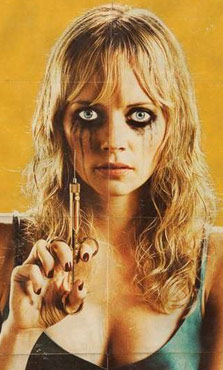
“Grindhouse” isn’t much different than anything Robert Rodriguez and Quentin Tarantino have been giving audiences for the last decade or so. Rodriguez’ half, “Planet Terror”, crackles with the boyish mischief of a geek melting his toy soldiers with a lighter and a can of Aquanet. Tarantino’s contribution, “Death Proof”, manages to squeeze in some thrills and great dialogue between innumerable homages to the cheapest of the cheap in exploitation cinema. The resulting double feature, along with a handful of brilliant trailers for fake films, will live up to most fans’ expectations for the two directors.
The format is revealing. Viewed back to back, it is apparent that Rodriguez is actually the superior talent of the two. He is fresher, more inventive, and though he is just as playful with his influences as Tarantino, they don’t come off as grating self-indulgences. “Planet Terror”, like “Once Upon A Time In Mexico”, joins outrageous brutality with surgical comic timing to thrilling effect. Rodriguez’ film rumbles with the pure boyish joys of the sandbox, only a giant expensive sandbox: bigger, badder, bolder, at once the height of cool and completely unconcerned with how cool it may or may not be. “Planet Terror” wants to be a true grindhouse movie. No more, no less.
There’s something “Spinal Tap” about it, in fact. Rodriguez is not presenting us with anything new, he’s just turning the volume up to 11. Blood packs are splashier, explosions are bigger, zombies eat human flesh like a Little League team gorging on large pizzas sloppy with stringy mozzarella, etc. The conceit of stripper Rose MacGowan’s machine gun leg is satisfying beyond words. It’s one of the funniest gore comedies ever made.
When Tarantino arrives in the back stretch with his usual motor-mouthed cool, the change in tone is like a needle being rudely yanked off of spinning vinyl. Variety is good, but variety at the cost of any momentum at all is deadly, and Rodriguez—along with the side-splitting fake trailers created by the likes of Eli Roth and Edgar Wright—has “Grindhouse” burning rubber by the time it runs smack into a brick wall in the form of four women in a car talking about nothing.
Tarantino’s dialogue works best when used in situations where people are not expected to do a lot of talking. The secret is in his knack for unusual verbal rhythms. He uses dialogue to disrupt the rules of the genre in which he’s working more than tweaks to its conventions. So two hit-men pause before a killing to discuss TV pilots and foot massages, or a man about to be tortured for information gives a long monologue about Sicilians. But dwelling on four girls languidly talking about nothing of interest, in an expected situation (a car ride), falls as flat as roadkill.
When the second quartet of girls appears, their smarts, humor, and spunk pull “Death Proof” back from the brink. The movie gets right back on track. Still, you wish he’d gotten out his red pen and showed his script some tough love. “Death Proof” tries to transcend grindhouse when it shouldn’t. Rodriguez has once again made a great movie while seeming not to care, and Tarantino has made another decent but fatally flawed tableau (“Kill Bill” all over again) while seeming to care a whole lot. Interesting to speculate about how their careers would have gone if Rodriguez had won the Palm d’Or at Cannes and Tarantino had made the “Spy Kids” movies.
Nevertheless, the sum of “Grindhouse” is a smash. The movie is full of gross-out laughs and perfect genre touches. Freddy Rodriguez and Rose MacGowan are superb in giving their characters the requisite melancholy demanded by the genre. Kurt Russell is unforgettable as a washed-up homicidal stuntman, and indestructible Zoe Bell is a revelation as his intended victim. The final freeze-frame of “Death Proof” is the feel-good moment of the year.
Above all, “Grindhouse” glows with its directors’ passionate love of movies. The trailers, faux pops and crackles in the film, and theater adverts are done so well that it succeeds not only in resurrecting a genre but evoking a sense of place. It’s hard not to feel we’ve lost touch with something important. Grindhouse moviehouses are unfamiliar to most people, but one needn’t have enjoyed the original experience to taste what’s absent from modern multiplexes, where the presentation of movies feels no different than the broadcast of ads for soap and soda. “Grindhouse” hearkens back to a distant age when theaters were churches and movies were demented sermons. Tremendous fun. |